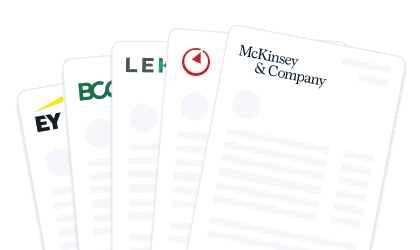Mastering Consulting Case Frameworks: A Comprehensive Guide
Looking to excel in consulting case interviews? Our comprehensive guide to mastering consulting case frameworks is here to help! Learn the essential skills and strategies needed to ace your next case interview and land your dream consulting job.
Posted June 13, 2025

Join a free event
Learn from top coaches and industry experts in live, interactive sessions you can join for free.
Table of Contents
Aspiring and current consultants alike are often presented with a wide range of complex business problems that require critical thinking, flawless logic, and a structured approach to solve. This is where consulting case frameworks come in handy. In this comprehensive guide, we will explore the different types of consulting case frameworks, tips for analyzing data, and how to prioritize key issues to make a compelling recommendation at the end of your analysis.
What are Consulting Case Frameworks and Why are they Important?
Consulting case frameworks are structured approaches to analyzing and solving a complex business problem. Consulting firms use case interviews to evaluate a candidate's ability to break down a problem into its essential parts, identify key issues, develop hypotheses, and recommend solutions. Mastering consulting case frameworks is crucial to succeeding in these interviews and, ultimately, becoming a successful consultant.
There are several types of consulting case frameworks, including profitability, market entry, and mergers and acquisitions. Each framework provides a structured approach to analyzing a specific type of business problem. For example, the profitability framework helps consultants identify the key drivers of a company's profitability and develop recommendations to improve it. Similarly, the market entry framework helps consultants evaluate the feasibility of entering a new market and develop a strategy for doing so. By mastering these frameworks, consultants can quickly and effectively analyze complex business problems and provide valuable insights to their clients.
The Benefits of Mastering Consulting Case Frameworks
When you master consulting case frameworks, you will not only be successful in consulting case interviews but also in your job as a consultant. You will be able to approach client problems with a structured approach, baseline knowledge, and deliver more accurate and effective recommendations. Your approach will also lead to better communication and collaboration with your team and your clients
Additionally, mastering consulting case frameworks can also lead to increased confidence in your problem-solving abilities. By having a clear and structured approach, you will feel more equipped to tackle complex problems and provide valuable insights to your clients. This confidence can also translate to other areas of your work and personal life, as you develop a strong problem-solving mindset.
How to Approach a Consulting Case Framework
The first step in approaching a consulting case framework is to identify the problem or objective. Understanding the issue at hand will help you determine which framework to apply and where to focus your attention. You need to break down the problem into its essential parts and brainstorm with the interviewer to identify the key issues, limitations, and underlying factors.
Once you have identified the key issues, it is important to prioritize them based on their impact on the problem. This will help you determine which issues to tackle first and which ones can be addressed later. It is also important to consider the resources available to you and the timeline for solving the problem.
After prioritizing the issues, you can start applying the appropriate framework to analyze the problem. There are several frameworks that can be used, such as SWOT analysis, Porter's Five Forces, and the BCG matrix. It is important to choose the framework that best fits the problem at hand and to adapt it as needed throughout the analysis.
Breaking Down the Different Types of Consulting Case Frameworks
Consulting case frameworks can be broken down into three categories: business situation frameworks, market analysis frameworks, and profitability frameworks.
Business situation frameworks are used to identify the root cause of a business problem or opportunity. It includes frameworks such as the 4 Cs (Company, Customer, Competition, and Collaborators), McKinsey 7S, and SWOT (Strengths, Weaknesses, Opportunities, Threats).
Market analysis frameworks are used to analyze external factors that might impact the business. It includes frameworks such as PESTLE (Political, Economic, Social, Technological, Legal, and Environmental) and Porter's Five Forces.
Profitability frameworks are used to analyze revenue, costs, profits, and margins. It includes frameworks such as profit and loss statements, break-even analysis, and price elasticity.
It is important to note that while these frameworks are useful in analyzing different aspects of a business, they should not be used in isolation. A comprehensive approach that combines multiple frameworks and takes into account the unique context of the business is necessary for effective problem-solving and decision-making.
The Most Common Consulting Case Frameworks and How to Use Them
One of the most common consulting case frameworks is the 4 Cs. It is a business situation framework that helps analyze customers, competitors, collaborators, and company capabilities. Another popular framework is the McKinsey 7S framework, which focuses on seven critical elements: strategy, structure, systems, staff, style, skills, and shared values. The PESTLE framework is a market analysis framework that helps identify macroeconomic factors that impact the business.
Profitability frameworks such as the profit and loss statement or break-even analysis are also common frameworks used in practice. These frameworks help analyze revenues, costs, profits, margins, and break-even point.
Another commonly used framework is the SWOT analysis, which stands for strengths, weaknesses, opportunities, and threats. This framework helps identify internal and external factors that affect the business and can be used to develop strategies to address them. The value chain framework is another popular framework that helps identify the activities that add value to the business and those that do not.
It is important to note that while these frameworks are useful tools for analyzing business situations, they should not be used in isolation. It is important to consider the specific context of the business and tailor the framework to fit the situation. Additionally, it is important to use critical thinking skills and not rely solely on the framework to make decisions.
Building a Strong Foundation: Key Concepts to Understand Before Tackling Consulting Case Frameworks
Before digging into consulting case frameworks, there are key concepts that one needs to understand. These concepts include value creation, Porter's five forces, industry analysis, and market segmentation. Understanding these concepts is crucial to your ability to analyze business problems systematically and apply frameworks effectively.
Another important concept to understand is the SWOT analysis, which stands for strengths, weaknesses, opportunities, and threats. This analysis helps you identify the internal and external factors that affect a company's performance. It is a useful tool for developing strategies and making informed decisions.
Additionally, it is essential to have a good understanding of financial statements, such as the income statement, balance sheet, and cash flow statement. These statements provide valuable information about a company's financial health and performance. Being able to analyze financial statements is crucial for identifying areas of improvement and making recommendations to clients.
Tips for Analyzing Data in Consulting Case Frameworks
During the case interview, you will be provided with data, which you need to analyze effectively. The first step is to understand the context and data you are provided. You then need to organize the data into a structured Excel or PowerPoint model that allows you to present your analysis smoothly. Finally, synthesizing the data and focusing on the most critical information will contribute significantly to your success in the case interview.
One important tip for analyzing data in consulting case frameworks is to pay attention to the details. Often, the data provided in the case interview will contain subtle nuances that can significantly impact your analysis. Therefore, it is crucial to carefully review the data and identify any potential inconsistencies or outliers that may affect your conclusions.
Another useful strategy is to leverage your knowledge of industry trends and best practices. By staying up-to-date on the latest developments in your field, you can bring a unique perspective to your analysis and identify opportunities for innovation and growth. Additionally, by demonstrating your expertise in the industry, you can build credibility with your interviewer and showcase your potential as a consultant.
How to Identify and Prioritize Key Issues in a Consulting Case Framework
The process of identifying and prioritizing key issues involves mapping the different problems to the relevant frameworks, breaking down each problem to sub-issues, and using a prioritization matrix to identify which issues to focus on first. Effective problem-solving prioritizes analysis by highest impact, significance, and feasibility.
One important factor to consider when identifying and prioritizing key issues is the client's goals and objectives. Understanding what the client hopes to achieve through the consulting engagement can help consultants determine which issues are most critical to address. Additionally, it is important to consider any constraints or limitations that may impact the feasibility of addressing certain issues.
Another key aspect of identifying and prioritizing key issues is gathering and analyzing data. Consultants must gather relevant data to fully understand the scope and impact of each issue. This data can then be used to prioritize issues based on their potential impact on the client's business and the feasibility of addressing them within the given timeframe and budget.
Developing and Presenting Recommendations Based on Your Analysis
Based on your analysis, you will need to develop and present recommendations. Your recommendations should be anchored in your analysis and provide clear-cut guidance for the client. Providing a clear and structured presentation of your recommendations helps convey your thought process and provides context for your recommendation.
When developing your recommendations, it is important to consider the client's goals and objectives. Your recommendations should align with these goals and provide a clear path forward for the client to achieve them. Additionally, it is important to consider any potential challenges or obstacles that may arise during implementation and provide strategies for overcoming them.
When presenting your recommendations, it is important to tailor your communication style to the client's preferences. Some clients may prefer a more visual presentation, while others may prefer a more detailed written report. It is also important to be prepared to answer any questions or concerns the client may have and to provide additional support as needed to ensure successful implementation of your recommendations.
Conclusion
If you want to be successful in consulting case interviews and become a successful consultant, mastering consulting case frameworks is essential. Understanding the different types of consulting case frameworks, tips for analyzing data, and prioritizing key issues when producing recommendations are all necessary skills you need to develop to become the next premier consultant.
Additionally, it is important to develop strong communication skills to effectively convey your recommendations to clients and team members. This includes being able to clearly articulate your thought process, actively listening to feedback, and adapting your communication style to different audiences.
Furthermore, staying up-to-date with industry trends and news is crucial for success in consulting. This involves regularly reading industry publications, attending conferences and networking events, and seeking out opportunities to learn from experienced consultants in your field.
Equip yourself with specialized knowledge and acquire the skills that top firms demand with these extra articles:
































